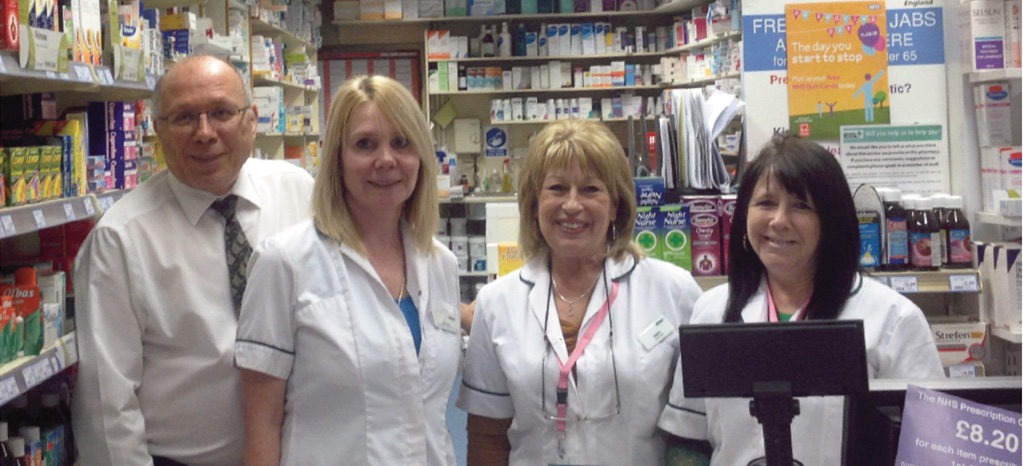Practice

Small but perfectly formed
In Practice
Record learning outcomes
There's much we can learn from a modest pharmacy in Wickford, Essex, that is dedicated to providing a first-rate service

Medipharm pharmacy in Wickford, Essex, may appear modest, measuring in at around 60 square metres and having just five members of staff, yet it’s clear the service it provides outweighs its size. The list of services that the pharmacy provides is extensive, ranging from smoking cessation and substance misuse to erectile dysfunction and hair loss. All of this helped the pharmacy to win Avicenna’s Pharmacy of the Year accolade, and accuracy checking technician Vanessa Bird to be shortlisted for Pharmacy Technician of the Year.
Going the extra mile
Despite being the smallest of three competing pharmacies on its high street, Avicenna-owned Medipharm consistently issues the most prescriptions, and, between January and April 2015, flagged up more than 100 errors concerning GP prescriptions. “We often phone and email doctors and challenge prescriptions,†says pharmacist Ahmed El-Dabbagh.
“Our relationship is very professional, but we don’t hesitate to speak to doctors.†Ahmed accredits the pharmacy’s success to the service that the team provides. “We treat people as patients, not customers,†he explains.
“I always say to my team ‘to know you are doing well with a customer, consider them as part of your family. Provide the same level of compassion as you would if your brother, father or mother was ill.’ Sometimes patients want to chat for half an hour, but we listen because that’s part of their treatment.â€
Beyond dispensing prescriptions, Medipharm strives to make its customers feel valued, sending out birthday, bereavement and get well soon cards, and even sticking post-it notes on deliveries to brighten up their day. “Older people are often lonely, so they really cherish these little gestures,†says pharmacy technician Debra Corp, who has worked at Medipharm for 10 years.
“A regular came in and his mum had just passed away. He was heartbroken and burst into tears, so I walked him home and kept him company until he was feeling calmer.†Delivery driver Mel Alexander even saved an elderly customer’s life when she failed to answer the door to receive her regular prescription.
“I heard faint speech and we have an agreement that if she doesn’t hear me, I bang on the lounge window because she’s a bit deaf,†explains Mel. “A lightbulb went on in my head and I realised she must have fallen out of bed.â€
Mel called 999 and talked to the customer through the letterbox until an ambulance arrived. “It turned out she had broken her hip,†says Mel. “Her son came in with flowers for me the following week.â€
Spreading the word
Each month, Medipharm supports awareness campaigns, which are displayed on a screen for customers to view while waiting for their prescriptions. “It attracts customers and makes it easier to start awkward conversations – for example about weight,†explains Ahmed. However, when it comes to initiating such discussions, Ahmed quickly disregards any embarrassment.
“If a patient comes in who is overweight, I give them advice and then it’s their choice how they act upon it,†he explains. “I’m not worried about looks, I’m worried about health. I’m not a man on the street, I’m a pharmacist. My job is to care about people.â€
And he adopts a similar, no-nonsense approach to smoking cessation: “If we know a customer is a smoker, we don’t let them leave until we’ve discussed the benefits of quitting!†Ultimately, however, when it comes to health, Ahmed believes responsibility falls to the individual. “It’s your body, it’s your health, you have to decide if a medicine is right for you, but the healthcare professional can advise,†he says.
Looking to the future
Despite a pharmacy career that spans 33 years, Ahmed admits that the industry still throws up some challenges for him: “Pharmacy isn’t specialist – we have to know about eyes, skin, heart health, cancer. It’s very broad, plus we’re dispensing.â€
He believes that pharmacies are now more involved in patient care than ever and the public perception towards them is starting to change. “When I was studying, I had to learn about pharmacology, physics, chemistry, all sorts of things, and we never used it, we just dispensed,†he explains.
“We’d ask patients questions and they’d say ‘what’s that got to do with you? Just give me the treatment.’ Now we’re more involved. We help, we expand our knowledge and put forward ideas.â€
And, in Ahmed’s opinion, this doesn’t look set to slow any time soon. “Treatment is expanding, the responsibilities of healthcare professionals are growing. Pharmacy has to support this expansion,†he says.
However, Ahmed admits that there is still a way to go in convincing the public of pharmacy’s expertise. “The public are slowly recognising the value of pharmacy and what the industry can offer, but the media is not helping,†he says. “Pharmacies never appear on Eastenders. They need to be shown as the first port of call.â€
Pharmacies never appear on Eastenders. They need to be shown as the first port of call
